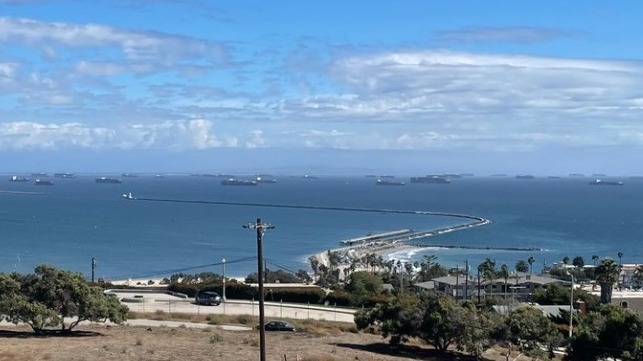Bill Proposes Congressional Task Force Explore SoCal Port Congestion

With the backlog of ships remaining largely stable off the California ports, there is an increasing number of proposals to address the problem and seek solutions. The latest is a proposal in the U.S. House of Representatives to form an interagency task force to immediately work on addressing the backlog at the Ports of Los Angeles, Long Beach, and along the Southern California Coast.
California's representatives Josh Harder and Michelle Steel introduced the legislation saying that the backlog is causing rising prices and hurting California’s farmers. Their proposal for the task force would bring together government agencies looking both at the bottleneck and its cost and impact, as well as related issues including the oil spill from the ruptured pipeline off Southern California.
“Our families are facing rising prices at the grocery store while our farmers are struggling to get their products to market and we know exactly why – the crisis at our ports,” said Harder. “Democrats and Republicans agree that we need to get prices under control and let our folks get back to shipping their products around the globe. This bill puts politics aside so we can actually address this crisis.”
Coast Guard Commandant Adm. Karl L. Schultz, would chair the task force. The bill calls for participation from a broad range of government, including the Environmental Protection Agency, Department of Agriculture, Department of Commerce, Department of Defense, Department of Energy, Department of Health and Human Services, Department of the Interior, Department of Justice, Department of Labor, Department of State, Department of Transportation, Federal Emergency Management Agency, Federal Maritime Commission, and General Services Administration. State agencies and the local port authorities would also be included.
“We have a crisis at our ports,” said Steel. “American families want us to ease this backlog and get these ships moving and out of our waters.”
Their task force would be responsible for making recommendations to Congress to address delays within the ports. The focus would include evaluating and quantifying the impact of the backlogs at Los Angeles and Long Beach ports as well as quantifying the costs incurred by other Federal, State, and local programs due to backlog. In addition to steps to improve the supply chain, they are also looking at collateral issues concerning safety related to the ships waiting offshore. It would be responsible to investigate the recent oil spill, evaluate the response, and provide a plan to address the environmental issues as part of a report to Congress on the solutions required to the supply chain problems in Southern California.
This legislative approach comes as the ports of Los Angeles and Long Beach are preparing to begin imposing their fees for slow-moving containers. By some estimates, more than 600 containers might be currently eligible for the fee that starts are $100 and grow exponentially each day. The ports, however, believe the announcement of the policy could be helping to focus shippers on moving their containers.

that matters most
Get the latest maritime news delivered to your inbox daily.
Despite that, the Marine Exchange of Southern California is preparing for a new wave of arrivals over the next three days. “A huge 47 vessels are scheduled to arrive over the next three days, which is a huge 10 more than the normal level (i.e. pre-pandemic),” but only 16 are containerships. There are currently 72 containerships at anchor or waiting beyond the anchorage for terminal space in the ports. Overall, the authority managing vessels in the area expect the situation to remain stable with no significant changes in the near term.
